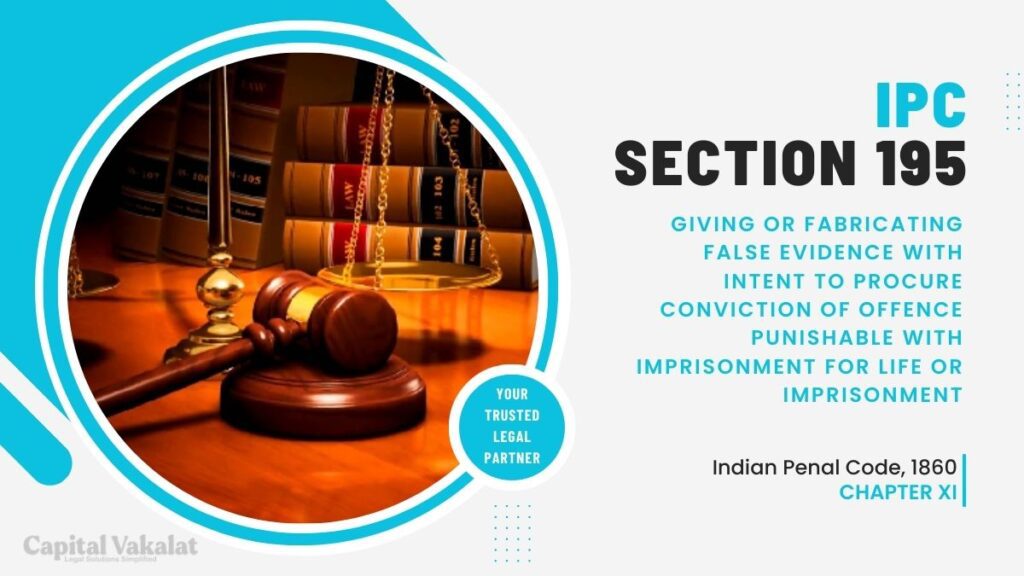Section 195 of the Indian Penal Code (IPC) deals with the grave offense of giving or fabricating false evidence with the intent to procure the conviction of an individual for an offense punishable with imprisonment for life or imprisonment.

This legal provision plays a crucial role in maintaining the integrity of the justice system in India.
Introduction to Section 195 IPC
The Indian legal system is based on the principles of justice, fairness, and truth. Section 195 IPC is an embodiment of these principles. It sets out to penalize those who attempt to manipulate the justice process by providing false evidence or fabricating it with a malicious intent.
Purpose of Section 195 IPC
The primary purpose of Section 195 IPC is to ensure that the justice system remains untainted by false evidence. It acts as a safeguard against individuals who might try to subvert the legal process by providing deceptive information.
Understanding False Evidence
False evidence refers to any information, statement, or material that is untrue and intended to mislead the court or investigating authorities. Such evidence can include forged documents, perjury, and false testimonies.
Fabricating False Evidence
Fabricating false evidence is a serious offense. This involves the intentional creation of false information or the tampering of existing evidence with the aim of securing a conviction in a case.
Intent to Procure Conviction
The crucial element in Section 195 IPC is the intent to procure the conviction of an individual. Mere false evidence is not sufficient; it must be proven that the intent was to secure a conviction.
Offenses Punishable with Life Imprisonment
Section 195 IPC specifically targets offenses that are punishable with life imprisonment. These are some of the most severe offenses in the legal framework and require a higher level of scrutiny.
Offenses Punishable with Imprisonment
In addition to life imprisonment, the section also covers offenses that are punishable with imprisonment. This includes a wide range of offenses, making it essential for maintaining the truthfulness of evidence.
Legal Implications
When false evidence is given or fabricated, it not only undermines the credibility of the justice system but can also lead to wrongful convictions. Section 195 IPC acts as a deterrent against such actions.
Prosecution Under Section 195 IPC
To initiate a prosecution under Section 195 IPC, a formal complaint or permission from the concerned authorities is necessary. This ensures that the section is invoked only when there is credible evidence of an offense.
Punishments Under Section 195 IPC
The section prescribes punishments for those found guilty of giving or fabricating false evidence. These penalties can include fines and imprisonment, depending on the severity of the offense.
Challenges in Proving Offenses
Proving that false evidence was given with the intent to secure a conviction can be challenging. It requires a thorough investigation and a clear demonstration of malicious intent.
Historical Significance
Section 195 IPC has a rich historical background, with roots dating back to the inception of the Indian Penal Code. It has played a pivotal role in ensuring the integrity of the Indian justice system.
Controversies Surrounding the Section
Over the years, there have been debates and controversies regarding the application of Section 195 IPC. Some argue that it may be used to suppress genuine complaints.
Recent Cases
Recent cases have brought Section 195 IPC into the spotlight, highlighting its importance in preventing miscarriages of justice. These cases serve as reminders of the need for such legal provisions.
Conclusion
Section 195 IPC stands as a guardian of truth and justice within the Indian legal system. It serves to protect individuals from false accusations and wrongful convictions while upholding the values of honesty and fairness.
Frequently Asked Questions
How is intent to procure conviction proven in cases under Section 195 IPC?
Proving intent often requires a thorough investigation and establishing a clear motive.
Are there any exceptions to Section 195 IPC?
While there are exceptions, they are limited and apply in specific situations.
Can Section 195 IPC be misused to suppress genuine complaints?
There have been allegations of misuse, but the legal process ensures proper scrutiny.
What penalties can be imposed under Section 195 IPC?
Penalties can include fines and imprisonment, depending on the nature and severity of the offense.